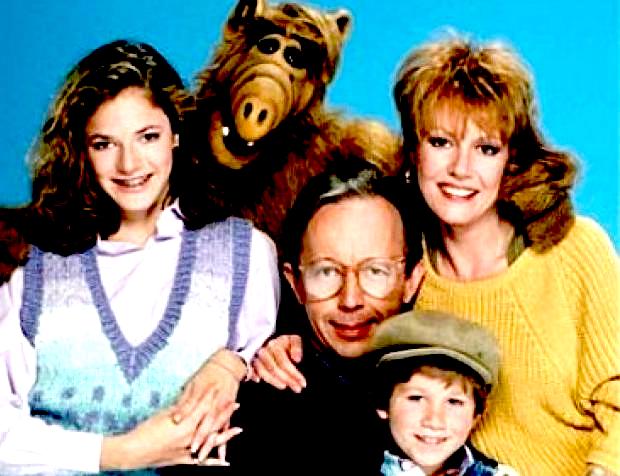No matter how outlandish comic stories become, they must nonetheless be ‘believable’.
Given that a comic story could include, for example, an elephant juggler marrying his uncle to save the planet from a Tic-Tac invasion, the issue of believability may seem irrelevant. But the believability of any sitcom is based upon two criteria:
-
Once a reality is established, no matter how tenuous or far-fetched it may be, that reality must not change.
The physical laws of the show’s world may be presented in a rudimentary way—the sets, special-effects and props may be crude—but once established, those laws must remain consistent.

For example, the alien Alf (Alf) is quite obviously a furry puppet. Nevertheless, he is always accepted by the other characters as a real alien. The Ghost and Mrs. Muir features a ghost who can only be seen by the widowed Mrs Muir, now living in his house. Although he loves her, love can only do so much and he is never able to kiss her. The action in Bewitched obeys the laws of magic as the characters present them: some spells can’t be fixed with a twitch of the nose; certain procedures must be carried out. The astronaut in I Dream of Jeannie accepts that his flatmate is a genie with godlike powers. The world obeys Jeannie’s commands, but even so she can be trapped helplessly in her bottle. The physics of this ‘reality’ never change throughout the series.
-
Characters must always act and react according to their natures.
Whatever your characters think, feel or do must always be consistent with their true natures. A scenario may be ludicrously far-fetched, but the characters’ choices must remain consistent and credible. So long as the peculiar physics of your comic universe are observed, and the characters behave in a way that’s consistent with their natures, the comedy writer is afforded considerable latitude in their portrayal of reality.
The audience will accept a scenario that is outlandish, unlikely or heavily reliant on coincidence, so long as they feel they can believe in the characters. .Consider the fairytales we accepted from childhood – three pigs with house building skills, a fairy godmother with magical powers (that inexplicably falter at midnight), a girl who sleeps for 100 years… Given our early training in make-believe, an alien life form (ALF) who lives with an average suburban family doesn’t seem that much of a stretch. All these scenarios are outlandish, but we’ll stick with them. However, if characters act against their natures without proper motivation, even though this may suit the writer’s purposes, the audience will reach for the remote control.
Comedy’s audience suspends disbelief with an eagerness that dramatists must envy. The science fiction world of Star Wars may have been based in a galaxy far, far away, but that galaxy and its outlandish inhabitants are depicted meticulously. A comedy, however, can be performed with glove puppets (Punch and Judy) or crude animations (South Park) because the audience’s enjoyment stems from the characters, not the illusion of reality. Most studio-based sitcom sets are fairly obviously studio sets, particularly when the action moves ‘outside’.
The backyard of a studio-based sitcom such as Home Improvement could never be mistaken for a real backyard. The plants are plastic, the grass is fake, the sunshine is fluorescent. The viewers are given just enough information to accept that the characters are in a yard. After that, their imaginations fill in the blanks as their attention is directed to the action.

In terms of plotting, sitcom takes liberties that drama dare not. Events are compressed and stories can turn on a dime several times in a segment. Stakes are raised at a breakneck pace in ways that would beggar belief in real life. For example, in Frasier, no sooner has Frasier established that he’s expecting a beautiful but delicate woman to arrive at his home for a date than his brother Niles crashes through the door in a drunken swoon, weeping over his unrequited love for the maid, Daphne. Once Niles has swiftly established his plight and that he’s too distressed to leave, there is another knock on the door: Frasier’s date has arrived. Frasier shoves Niles into a water closet. The whole sequence of events takes less than a minute.
In sitcom, once an object has been established as being of high sentimental or worldly value, the audience knows the object will be smashed, stolen, proven a fake, lost, given to charity by an unknowing friend or thrown out the window in a fit of pique. In Frasier’s case, the sense that his home is an oasis of calm and order is broken by Niles, but in comedy the same goes for anything or anyone to whom high stakes are attached. The twist can happen within seconds of the stakes being established but the viewers don’t object. Quite the opposite—swift escalations of stakes are both expected and desired, and tenuous co-incidences in the service of rapid plotting are forgiven by the audience and usually accepted by the characters.
Excerpt from The Cheeky Monkey – Writing Narrative Comedy
